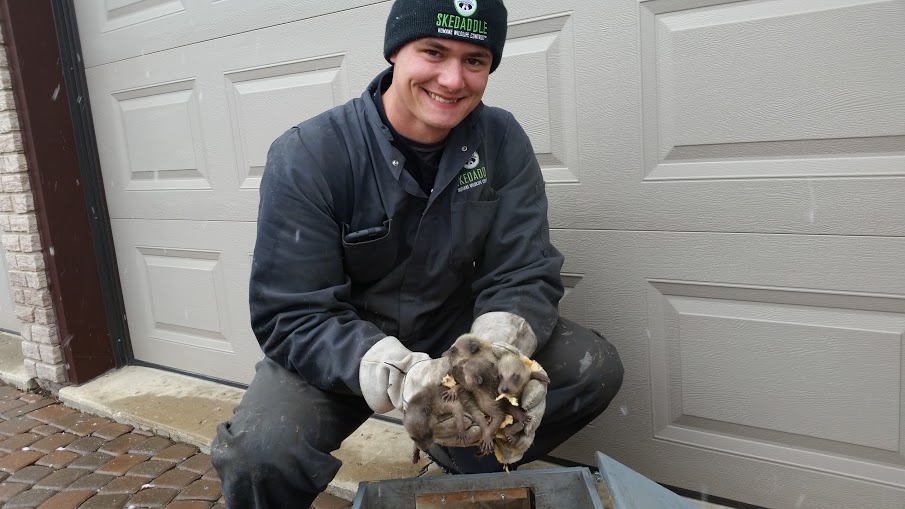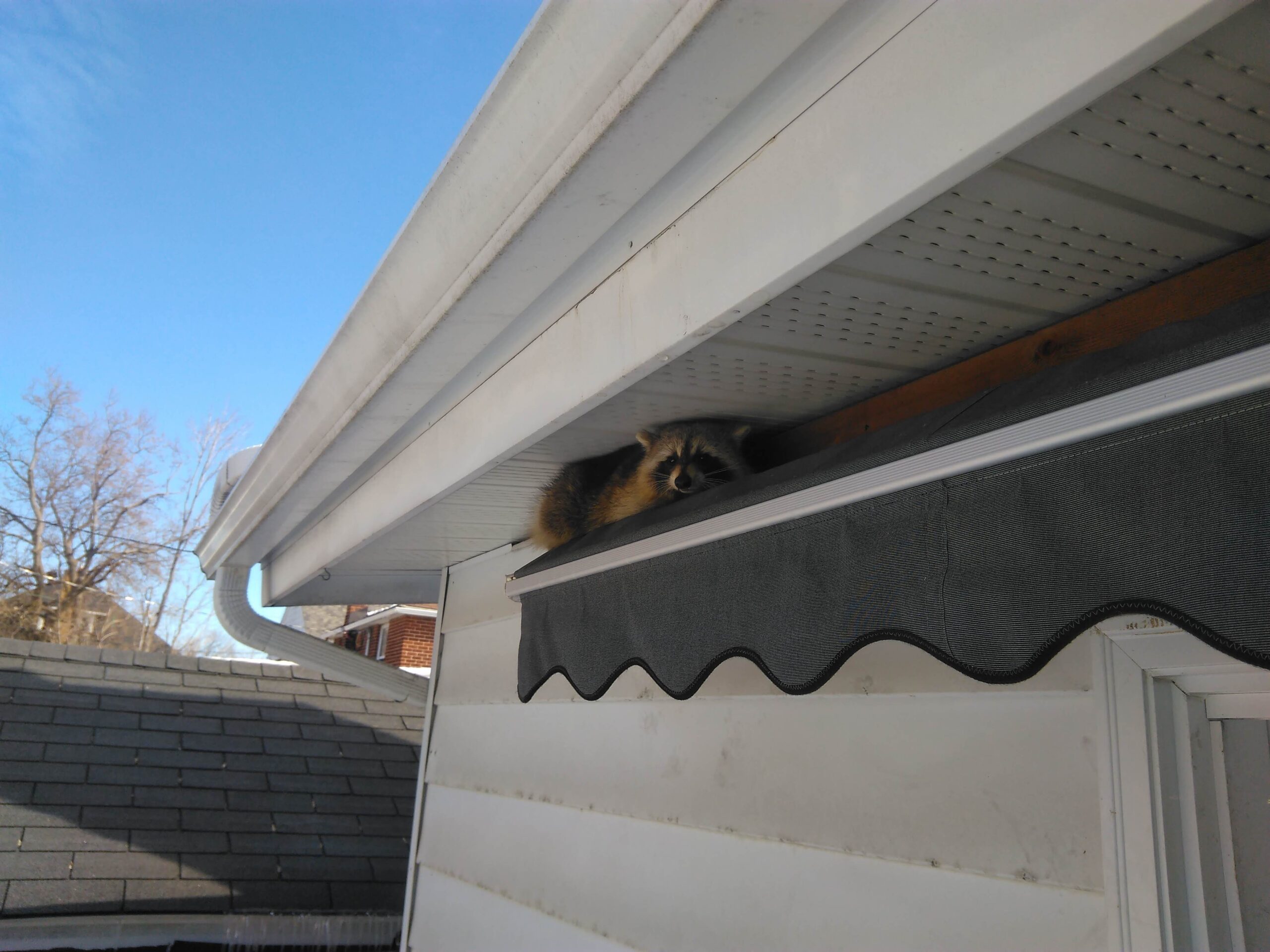If you live in or near an active raccoon habitat, chances are you’ve had more than your fair share of raccoon menaces. Nature’s naturally outfitted bandits are true to their name, and if you’ve ever had to deal with them during the winter when you expect most animals to be laying low, you know exactly what this means.
Raccoons choose winter dens that offer protection from predators and shelter from the elements. Raccoons do not hibernate, but they do enter a similar state called torpor and are not entirely inactive. We talk about what to expect from Durham raccoons in the winter and what you should do if you find them in your attic.
What Makes an Ideal Raccoon Habitat?
The masked bandit’s natural habitat is woodland environments close to water sources. In forested systems, they make their homes in hollowed logs or tree cavities. However, this highly intelligent creature learned to adapt to a wide range of habitats. It is perfectly at home in urban landscapes, where it has easy access to food and shelter from unwitting humans.
How Do Raccoons Handle Winter?
Raccoons are genetically wired to sense the signs of impending cold weather and start preparing to endure it. In the months leading up to winter, you may notice a fat raccoon or two waddling around your property. These critters pack on the pounds to get ready for the drop in food availability that accompanies the drop in temperatures. To prepare for winter, raccoons:
- Bulk up: Raccoons have a varied diet and aren’t picky eaters. In preparation for winter, they eat anything they can get their little paws on, storing up additional body fat and weight and almost doubling in size. This body fat becomes very useful during the winter when they become less active and can lose anywhere from 14 to 15 percent of their body fat.
- Choose a winter den: The masked bandit begins searching in the fall for an appropriate raccoon den to call home during the cold months. They seek shelters that protect them from predators and the weather. Two raccoon adaptations that come in handy at this time of year are its strong hands and excellent climbing skills, allowing them to make quick work of getting into your attic.
- Find a humane wildlife removal company: These critters are usually solitary, but in winter, they often make an exception in the name of keeping warm. Mothers and their offspring generally stay together until early spring, but males may hunker down with other males during the cold months to take advantage of the extra body heat.
Autumn is an excellent time to assess your property for signs of raccoon inhabitants. Once they find a winter den, they make themselves cozy until it’s time to mate. During their down times, they enter torpor, occasionally rousing to head out in search of food.
Raccoon Mating Season
Raccoons start mating in mid-January and have a typical gestation period of roughly 65 days, so the raccoons in your area will likely be nursing baby raccoons (or kits) during winter. Expectant mothers may leave their winter den to seek adequate shelter for raising their kits.
They give birth to anywhere from two to six completely helpless little ones, making your garage and attic, which are generally warm, safe havens, very inviting. The raccoon is an opportunistic animal, and the double benefit of an already prepared space, along with close proximity to food (both inside and outside your home), is enough to attract the animal to your home.
What Is Torpor?
Raccoons enter a state called torpor, a condition similar to hibernation but shorter in duration and not as intense. During torpor, raccoon body functions slow, and body temperatures drop. Their heart rate, metabolism and respiration decrease significantly, reducing the energy required for sustaining life. Torpor allows raccoons to rely on their stored body fat to survive.
Where hibernation lasts for months, torpor typically lasts for hours to days. However, during this state, their defences are lowered, making them vulnerable to predators — yet another reason your attic is a prime winter raccoon den.
When raccoons wake up from this state, they may venture out to find food. The masked bandit is generally a nocturnal creature, but when winter nights are frigid, it may wander out during the warmer daylight hours.
While you are less likely to notice raccoon sounds in your attic in winter, you are more likely to see them during the day as they head out to forage. Raccoons eat almost anything, from eggs, insects, small mammals, fruit and birds to, of course, human garbage and gardens. Don’t be surprised when they rummage through trash cans left at the curb and leave you with a mess to clean up the following day.
How Can You Prevent a Raccoon Invasion?
The best solution for raccoon presence in your Durham home is to avoid it in the first place. Yes, prevention is always better than a cure. Skedaddle recommends taking steps to make your home unappealing to these critters early in the fall. You can trim your trees to prevent easy access to your roof and install motion sensor lights around the outside of your house.
You may also want to contact Skedaddle for prevention services. Our team assesses your property to determine whether raccoons are already present. If your property shows no signs of a current home invasion, they identify potential entry points and seal them off using heavy-gauge wire mesh to prevent future incursions.
What Should You Do if Your Home Becomes a Raccoon Habitat?

If you already have a raccoon problem on your hands, Skedaddle has you covered. Our expert team of wildlife technicians is trained and experienced in handling raccoon invasions. We will evaluate the situation in your home and devise a suitable, effective and humane raccoon removal plan for your Durham home, providing you with an itemized estimate. If kits are present, we ensure their safety, placing them in heated baby boxes outside your house so mom can move them to another den site.
Once your house is clear, we clean up the mess and remove contaminated materials. We also seal off entry points to remove the temptation for other raccoons to move in. When your home becomes a raccoon habitat, contact the professionals at Skedaddle for humane raccoon removal in Durham.



